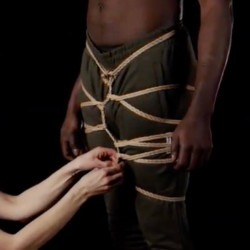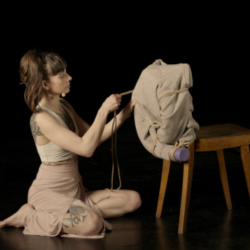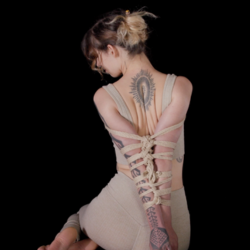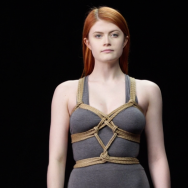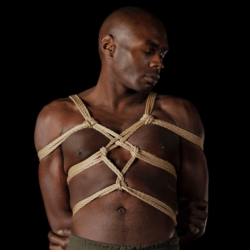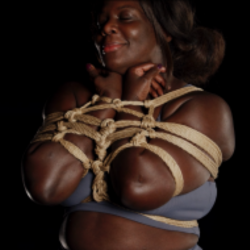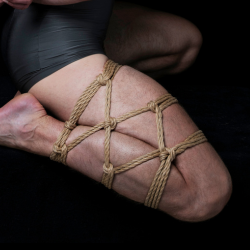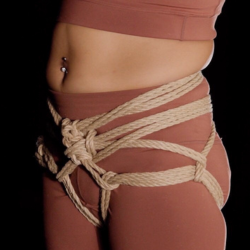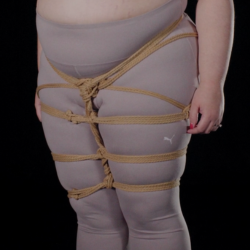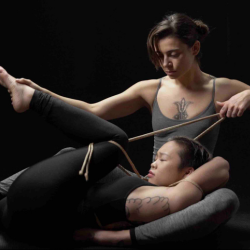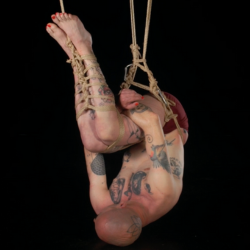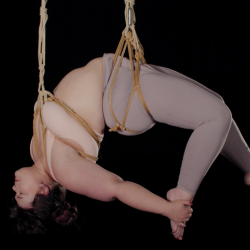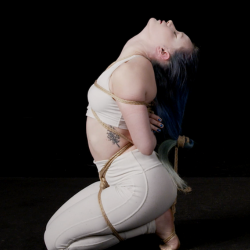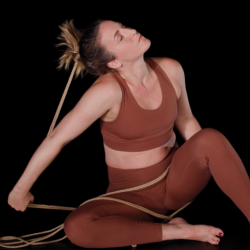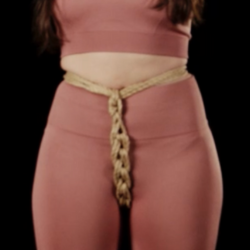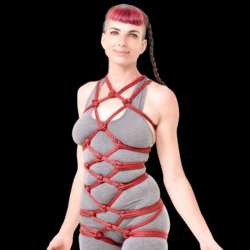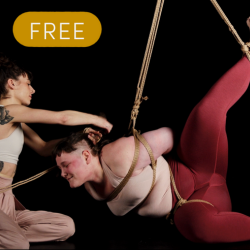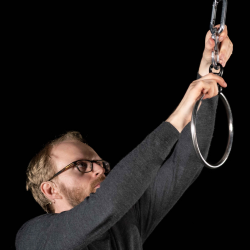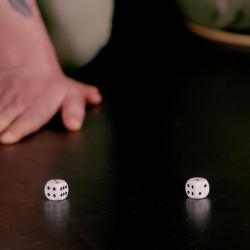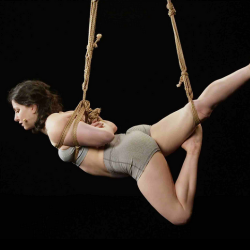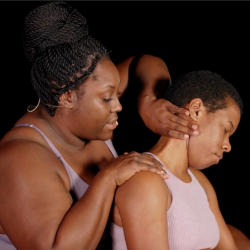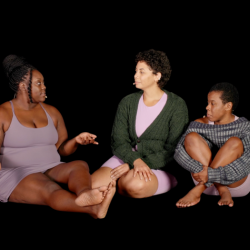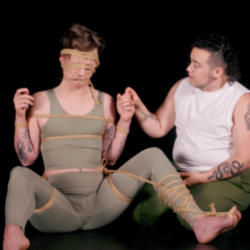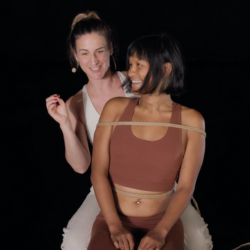EP 40
COLETTE PERVETTE
Colette Pervette's mission is to eradicate shame and teach people how to play again. In this episode, they dive into kink, ego dissolution, and intentional play, highlighting negotiation tips and the importance of curiosity in BDSM.

Colette is a professional Dominatrix of 18+ years. In her journey as a Domme, she spent the first decade of her career going deep into the art and practice of BDSM. Then she spent the last 8 years going inward and contemplating the theory behind the practice of BDSM and has since developed an alchemical philosophy and spiritual approach to the art of kink that she shares through her work.
As an Educatrix, Colettes teaches the art and practice of FemDom and BDSM to women and couples. She holds a PhD in Education from UC Berkeley, where her research focuses on misconceptions and conceptual change. Through her teaching and writing, she dispels misconceptions about kink, sex work and alternative sexuality. She guides women and femmes to find and cultivate their personal power by learning how to play with it in the bedroom, dungeon and beyond.
Colette teaches an online Dominatrix training course called MistressClass, where she takes you on an immersive journey where she shows you every step it takes to become a Dominatrix and come into your full power. She has guided and trained hundreds of women and femmes to become the Dominatrix of their vision.
https://www.pervette.com/
Instagram: @colettepervette
[00:00:10] Wicked Wren Hello to all my guys, gals and non-binary pals! Welcome to the Shibari Study podcast. I'm your host, Wicked Wren. Shibari Study is an online learning resource offering video tutorials for beginners or advanced practitioners. Whether you're brand new to the world of shibari and needing to learn the basics, or a seasoned rigger or rope bottom seeking inspiration to push your practice to new places, there's something for you at shibaristudy.com. Today I'm talking to Mistress Colette. Colette uses she/they pronouns and runs mistress classes. Mistress classes teach women how to come into their power and play. And I'm going to talk to Colette today about how that pertains to (…) and rope bondage, and things that people can take into their personal play and explore. How are you, Colette?
[00:01:04] Mistress Colette I'm good.
[00:01:06] Wicked Wren Amazing. Thank you for being on.
[00:01:09] Mistress Colette Oh, yeah. Thanks for having me.
[00:01:10] Wicked Wren You're welcome. Something fascinating about you is you said you record everything.
[00:01:18] Mistress Colette I do. I have this obsession with.... Not – I guess it's recording everything, everything in my day so that I don't forget. I like the idea of being able to go back and be like, what happened on October 7th, 2021? And then be like, Oh, okay. That day I did this and that. So I record in detail what I do in my days, what I eat, what the weather is like. And I also have an audio recorder, a sonic diary, and I record conversations with friends, family, sometimes subs, with consent.
[00:01:54] Wicked Wren I have so many questions about this. When do you physically put the notes down in the day?
[00:02:02] Mistress Colette It could be throughout the day. Could be at the end of the day. There's something really comforting about recording. So I record, like, the details of what I do. Sometimes the feelings, the thoughts, highlights as well.
[00:02:16] Wicked Wren When do you review these notes?
[00:02:20] Mistress Colette I sometimes just kind of go back and, like, open up my journal or my planner. I have these, like, planners by year, and it's just like, just written in really tiny, tiny print everything. And it just feels so comforting to have every day accounted for.
[00:02:42] Wicked Wren Have you always been a journaler?
[00:02:44] Mistress Colette No, no, I think it was probably since like 2014, when I felt like I was like, experiencing my spiritual awakening or the beginning of my spiritual journey. And a lot of things were unfolding, happening, all these synchronicities that I just felt like this is getting kind of weird. I want to record all of this so that I don't forget.
[00:03:07] Wicked Wren Also, another weird question. What do you eat most regularly? Do you find patterns in those things?
[00:03:14] Mistress Colette Yeah, I am one of those people that like to eat the same things over and over. Like I have rituals of having my matcha latte with, like, my 40 adaptogens in it. Scrambled eggs. Biscuit. Smoked salmon. I guess that's my breakfast. And then, dinner's always kind of different, but it's mostly like fish, vegetables.
[00:03:40] Wicked Wren Are these all digital? Are they written down?
[00:03:44] Mistress Colette All written.
[00:03:44] Wicked Wren Okay. Do you use digital stuff at all for this, or...?
[00:03:49] Mistress Colette I'm kind of an analog person. I love just writing with pen and paper. And the only thing that's digital are the audio recordings, which I started in 2014.
[00:04:00] Wicked Wren I'm also a very analog person. I cannot use apps on my phone. The to-do list apps and things like that do not work for me. And it was weird because I had to go back to analog. I felt like there was a huge push for me to use my phone and use apps when the iPhone came out, and then I realized, this just doesn't work for me, and I have to write this stuff down.
[00:04:23] Mistress Colette I know, same here. I tried all those apps like Trello and I can't remember all those like organizing checklist apps and did it for like a minute. And then I would just go back to like pen and paper and just writing in my journal the things I need to do.
[00:04:39] Wicked Wren It's way more intentional.
[00:04:41] Mistress Colette Yeah.
[00:04:42] Wicked Wren I'd like to do a year in review on my calendar. That's also really helpful for me. So in December, when it's Christmas break time and Christmas movies are on, I'll go back in my calendar and look through every single day and every appointment that I had and think, was this something I wanted to do? Or was this something that took away? And if it's something that was awesome, I make a note to add more of it. If it was bad, I'm, I don't do it again, obviously.
[00:05:11] Mistress Colette Yeah, well, that's cool. I like that.
[00:05:13] Wicked Wren I want to talk to you more about notes, but I think we need to start talking about (…) a little bit.
[00:05:21] Mistress Colette Oh, right. Okay. Sure.
[00:05:22] Wicked Wren Right, right, unfortunately. We'll have a whole another podcast only about note taking and documenting and things like that.
[00:05:30] Mistress Colette Okay, I'm totally down.
[00:05:32] Wicked Wren You seem like a really intentional person. You seem like someone that puts meaning and thought into everything you do. Does that also play into your (…)?
[00:05:44] Mistress Colette Yeah, I think so. I would say the word thoughtful does describe how I like to do things. It's thoughtfully. And that's why it takes, like, me so long to reply to emails too. Like, I'm thoughtful about it. So everything's just takes more time, and I give it a lot of space. And with (…), I am pretty thoughtful about how I go into scene, who I play with and how I play and how I want them to feel.
[00:06:13] Wicked Wren Was there a learning curve with being that intentional? Because when you're being intentional with everything in your life, some things probably don't pay off in the way you want it to, if that makes sense.
[00:06:30] Mistress Colette I think the beginning of that intentionality happened in my career as a (…), when I started to really be more aware and present with my sub, and which meant I was less self-conscious about myself as a (…). So the moment that I felt comfortable in my skin as a (…), the moment I didn't have the question, What do I need to do next? Or I hope they don't think I'm an amateur or, you know, once all of that was gone, I think I was able to be really present, thoughtful and intentional about how I want them to feel, how I want us to to play in this space.
[00:07:13] Wicked Wren What you just described is a very universal feeling, in and outside of (…), but specifically in (…) when you're playing with someone, I feel that's a huge, dominating thought. Does this, Am I going to be found out as a fraud? Is this person going to think I know what I'm doing? How long did it take you to get out of that?
[00:07:35] Mistress Colette I think it maybe took me... A couple of months of playing. Yeah. And sometimes it would happen more quickly, too. I felt like... If I'm lost in play with somebody, and I'm just so immersed in it, then I don't have that thought at all. But if there's anything that kind of just, like, comes up slightly and I'm like, Oh, wait, I wonder if they think I'm dominant enough? And I think it just took some time, but I think it was like after a couple of months that voice was gone. The voice of like, Oh yeah, yeah, you're a fraud. Yeah.
[00:08:17] Wicked Wren Do you think that voice has left forever? Or is that voice just so small now and pushed away?
[00:08:24] Mistress Colette I think I, I think it might be gone. I think I dissolved it and mostly through the work of meditation is huge. And I think (…) is also a meditation as well. So just being... Just realizing that when you're fully with somebody and, and when you're out of your head, can you really begin to play because otherwise you're just not really playing, but wrapped up in your own ego.
[00:08:50] Wicked Wren You're kind of defining confidence right now. There's nothing scarier or more dominant than someone who is completely centered in what they're doing and engaged.
[00:09:05] Mistress Colette Yeah. That's true.
[00:09:07] Wicked Wren Yeah. There's no way a sub could be on the fence about anything, if you're fully engaged in what they're doing or a bottom in anyway.
[00:09:16] Mistress Colette Right. Yeah.
[00:09:17] Wicked Wren Do you identify with calling yourself a teacher?
[00:09:22] Mistress Colette Yeah, I call myself a teacher. I also call myself an educatrix. Which is what my, one of my subs came up with that word when I got my PhD in education, and I was a (…) at the same time. And so he's like, you're an educatrix. Oh, okay.
[00:09:37] Wicked Wren I love that.
[00:09:38] Mistress Colette I mean, when I got my PhD in education, I kind of made a decision, Do I want to go into academia? Do I want to continue being a (…)? Because at that point, I was already six years into being a (…), and had everything set up, my own dungeon and was just like, you know, academia, (…)... And (…) just seems so much more fun, exciting, liberating. And I just get to call the shots. But I feel like I'm using my PhD now in how I teach, because when I – I got my PhD in misconceptions and conceptual change. So I looked at people's misconceptions about certain topics in science. So as a way to help them learn the more complex topic in science. So I looked at misconceptions in evolution in young children to help them overcome it.
[00:10:33] Wicked Wren The question has to be asked, what are people's biggest misconceptions about (…)?
[00:10:39] Mistress Colette Oh, I feel like there's so many and I feel like it's getting more and more mainstream normalized. But I think some of the misconceptions that people may still have about (…) is that those who participate in it or into it must have some kind of issue trauma, broken childhood or, and maybe there's something really off with them and they need to, like, act out these things. And, you know, that's maybe kind of my misconception that I had when I first started as a (…). I was like, Who are these people who would pay me to, like, beat them up and (…) on them? I don't get it. And, but that misconception got very quickly dispelled when I connected with my subs and the subs that I saw. Now it's just like, Wow, they're just like normal human beings who are super sweet and nice and thoughtful. And they're, they're just... Like, my friends.
[00:11:49] Wicked Wren What do you see as some of the biggest hurdles that new dominants or new tops have in entering scenes or play spaces?
[00:12:04] Mistress Colette I think the biggest hurdle is just really checking in with like... Checking your ego and making sure that just because you're playing the top, that you are not doing things because you think that that's how a top should be. I think one of the like a rookie moves that I see a lot of (…) make, including myself when I first started, is trying to assert your dominance through how much you could push someone. Either by pushing their, their limits of how much they could sustain this, you know, intricate rope bondage or how much pain they can take. I think that when I first started, I had the idea that a (…) power is defined by how much pain she can give her sub. And, you know, I took that, and so that was my unconscious definition. And when I shadowed the set like... I started at the gates, which is this house and commercial dungeon, there was no training. There was just shadowing sessions of other mistresses. And so I was shadowing the session with another mistress, and she let me paddle her sub, and I was like, Oh my God, this is the first time I'm playing with a Ssub. And I just thought, Okay, a (…) is supposed to like just dole out a ton of pain. So I picked up the paddle and just paddled him as hard as I could until Mistress Kitty just kind of gave me that, like, signal where it's like, Oh, just tone it down because the sub is wincing. And I just realized that that's not... That's actually not a measure of what a good (…) is. It's not by how much pain you could give your sub, it's by how much, how much your sub wants to take for you.
[00:13:49] Wicked Wren Everyone has a different meter for every day. Everyone comes in and the meter is never the same. A ten of ten is calibrated differently for what's going on that day, and I think it's so important for a top to understand that and be able to not allow the sub or the bottom to feel like they can't hit that full quote unquote meter and making the expectation that you've done everything. You've climbeb the mountain. You've done everything to make me happy based off of what you can do in this moment. I think it's really important. I bring this up because a lot of times in rope we have a sequence in mind or we have an endpoint, and some days that can happen, some days that can't happen.
[00:14:38] Mistress Colette Right, yeah.
[00:14:39] Wicked Wren And it sucks when you end that, and feel like you failed. Versus saying we've done this together and where we've gotten is where we gotten.
[00:14:50] Mistress Colette Yeah. Yeah. I think that's a really good point of being able to kind of see it as a dance, right? And there isn't really a designated endpoint in the dance. It's just, Did you, did you have a good dance? Did you enjoy the process? Did you find your flow together? Did you begin to really read into each other's cues so that you could just flow? That's the measure of a good scene.
[00:15:17] Wicked Wren You were talking earlier about eradicating shame. Can you tell me about what that means?
[00:15:25] Mistress Colette I think that's kind of one of [00:15:27]my personal missions to eradicate shame. [2.6s] And I think that shame, stigma, judgment, all of that. And I think that's what probably what made me feel so drawn to (…), because it is a space where you, where you play with all of that and you dissolve it by being able to express the things that maybe you held in and it was your shame. I've had so many experiences with subs where they're like, Oh my god, I thought that playing in this way, being sissified or being (…) in the (…) and all of this would make me feel deep shame about my desires. But I actually feel so good about it when we play. And, and I think that the alchemy of being able to dissolve that shame is just in the expression and the expression of how you feel of your desires and not being, not feeling like you have to hold it in. And so I love being that person that people come to with their secrets, their innermost desires, and be like, I never told anyone about this, and and they feel safe to explore all of that. I think the opposite of shame is just curiosity and feeling safe to explore.
[00:16:49] Wicked Wren When you talked about someone coming in and sharing something with you they haven't verbalized before. It's a very intimate space. That puts a lot of power in your hands. How do you approach a conversation like that?
[00:17:06] Mistress Colette With a lot of curiosity. I think just keep on asking like, Oh, when did you start thinking about that and where did that come from? And when was the last time you got to play in that way? Just keep on asking. I feel like I just want to get like the fullest picture of the person in front of me. Their internal world, their story. And once I get a sense of who they are, how they tick, what what are their sweet spots, what are their limits and hard limits, then I can feel ready to play.
[00:17:39] Wicked Wren Curiosity. That's such an amazing thing to bring up, because I think that that is lost because a lot of the times we just want to do our (…) to each other, and we're looking for ways to apply this thing or this toy or this whatever. Whereas being curious and asking these questions where you're pulling things out and asking people to elaborate. That's how you get the real meat of the person.
[00:18:08] Mistress Colette Yeah. Yeah. And I think that sometimes we think that maybe it doesn't make a sound like we know what we're doing if we're asking too many questions. But I think that there's a way to approach all of this and make it fun, make it (…), make it exciting and folding it into part of your verbal (…), or your (…), right? Like, how does this feel when I do this to you? Scale of 1 to 10. What is this? Yeah.
[00:18:36] Wicked Wren I would love to talk about negotiations with you.
[00:18:40] Mistress Colette Okay.
[00:18:40] Wicked Wren You talked about [00:18:42]mastering the art of negotiation [1.9s] in one of your reels on your Instagram, which is amazing, by the way, everyone should go check out your Instagram. It's so good.
[00:18:51] Mistress Colette Thanks.
[00:18:52] Wicked Wren But I find that I don't love the actual word negotiation.
[00:19:00] Mistress Colette Yeah. That's true. It doesn't, it just sounds like there's this kind of like... Sounds too, like, legal or something lawyers would talk about or something. I feels like there should be another word that sounds a little bit more fun. Do you have one?
[00:19:18] Wicked Wren I use the word intake.
[00:19:20] Mistress Colette Oh, okay.
[00:19:21] Wicked Wren Cause I feel like that's what it is. A negotiation is what you do with a bank robber.
[00:19:26] Mistress Colette Yeah.
[00:19:27] Wicked Wren Okay. It implies that two parties are fighting for something. A negotiation implies that one side is going to lose. And yeah, this is a rant I get on every single episode this podcast. Sorry, sorry, I apologize to the recurring listeners.
[00:19:46] Mistress Colette I like that a lot. I might use that actually now.
[00:19:49] Wicked Wren You can steal it. Yeah. You're welcome. You take it. I would just love to hear how you negotiate with people, what it means to you. Things that you've stopped doing that you used to do maybe. Things that you've started doing that you really like.
[00:20:07] Mistress Colette I, I feel like yeah... Negotiation is or intake is one of those things that's just so important and fundamental. For me, it's like I, I just want to know. I want to know everything about this person that I'm playing with. And so it's asking about their story. It's asking about their desires. It's asking about what were some scenes that you really, really enjoyed and are memorable. What are some scenes that were really awful and what happened? And asking about like, What does it sound like? What does it look like when you're experiencing pleasure? What does it sound like when you're completely, completely turned off? What are some words that trigger you in a good way that excite you? What are some things that trigger you in a bad way and turns you off? It's really finding what all their sweet spots are and then also where their limits and boundaries are. And that's how I could carve out this, like, landscape and playground and of play. It's like by knowing exactly where their desires are and where their limits are, I can really begin to play with that, that space and go back and forth between their desires and then pushing their, their soft boundaries. And so I kind of make a delineation between hard limits and soft boundaries. Hard limits are things that you definitely don't go and do or even talk about when they say that that's something they're not into. You don't even use it as a way to like, you know, psychologically, mind (…) them. You just don't. See, that's off the table. But the soft boundaries, I think, are the things that they are into. But there is a boundary of how much they can take in the scene in that moment, in that context. They may be into (…), but there's a boundary of how much of the paddle they can take or flogging. And so you're there to find out where their soft boundaries are and how malleable it is, and how if they're super aroused and excited, how you could play with those soft boundaries and push them further. And so I like to kind of just get a sense of that space. And where are your sweet spots, where are your soft boundaries. And that's how I find the landscape of play.
[00:22:34] Wicked Wren I love how in that conversation, you never centered this scene that you're about to do, and you centered the other person and their experiences. Instead of saying in this scene, Would you like to experience this? Instead, you were like, What's an example of a scene that you liked? What's an example scene that you didn't like? What's it look like, what's it sound like, those things. It's thinking about the human being and not the scene you're about to do which is going to inform them. That's amazing.
[00:23:01] Mistress Colette Yeah. It's not about the laundry list of activities that you want to check off in, in your mind. It's really being able to get a sense of who they are, where they're at, and then based on what they share and say, then you could begin to, like, think about, Oh, well, if they're into that, maybe they might be into this. And I could bring that up either now or in the scene and, and see how they feel.
[00:23:25] Wicked Wren I want to dig into hard limits and soft boundaries. This is another thing that everyone is aware of in (…), whether it's rope bondage, whether you're seeing a pro. Everyone's aware of this, but no one really talks about it because it's difficult to talk about. As you said, hard limits are no goes. These are things that we don't even hint at. It's just things that people don't like. But a soft boundary is very different than a hard limit. And a lot of the fun of (…) is pushing against the soft boundaries and making someone uncomfortable. So my question here is how do you do this in an ethical way, in a way that doesn't lead to manipulation, gaslighting, different things like that?
[00:24:19] Mistress Colette I think it's just constant checking in with them and having that communication. Be open throughout the scene, and just being able to see, are they into this, right? If they're into whatever this activity is being bound and suspended and you check in with them and be like, How are you right now? And just being able to check in rather than pushing them to what you think would be a fun place to push them, right? It's just like, you're seeing them in an uncomfortable position, you're like, Oh, well, now what if I tied their hair back? And then, you know, and like, put the rope around their mouth. And they've already... It feels like they've already... Have been pushed to that limit and you push it even further. Like, it's not about breaking them. It's about getting to play as long as you can or just for as long as you wanted that scene to be. It's not about pushing them as hard and fast as possible to see where their limits are or where their, that, the breaking point is. It's about finding that, that place of are they excited and aroused by what you're doing? And if, in that that state of heightened arousal, can I get them to take more than they thought they could initially?
[00:25:42] Wicked Wren It is so funny because I've recently thought about this idea of being broken or breaking someone, and it doesn't make sense because when something is broken, you can't play with it again. You want to be able to experience more next time. You want to leave a little place to grow.
[00:26:01] Mistress Colette You kind of want them to come back wanting more. And then planting the seed for more... Like more depth and more whatever it is that they want. Like, I feel like I'm like... There's some subs of mine where they didn't even define themselves as a (…). But now just because I always push them just enough. And then a seed has been planted for the next time, they're like, Well, you know, I think you were just joking about the nails to the (…), but I'm kind of curious now. And like, it's kind of crazy. You just kind of plant these seeds and you let them kind of – let that germinate. And then you're just like doing the most subtle things to water that and nurture that, that sense of play and that sense of safety, so that they want to go deeper and deeper and know that it's a safe place to go. Because if you break them completely, they're like, I don't think they know me, right?
[00:27:01] Wicked Wren That makes sense. Yeah.
[00:27:04] Mistress Colette Unless you want to be broken. There's some who want to experience the pain or that experience of just being completely broken. And that's totally fine, too.
[00:27:13] Wicked Wren Yeah, that's a very different thing, too. And that's also something that I would never partake in the first, second, third time I would play with somebody. That's something that happens very far down the line, because it also comes with a lot of aftercare. That comes with a lot of other things that need to go along with it. You were talking about checking in with somebody often and hearing their input. And my question is there are a lot of different ways to say I'm okay. Some of them are less convincing than others. And some of them can feel like, this is what she wants me to do. This is what I'm going to do, and I'm okay with that. So I guess my question is, when you hear a little bit of hesitation in a voice, if you hear a false yes in some way, how do you approach that?
[00:28:07] Mistress Colette I feel like I would just kind of dial it back if I think that they're not being honest. And I think that what I try to foster in my relationships with my subs is honesty, in so that they're not going to try to push themselves to please me. Like, I want to know how they feel. And so honesty is such a huge piece in, in the scene. So I rarely have those experiences where they're saying yes when they don't really mean it, but sometimes does happen. And I try to just dial it back and, and check in with them and be like, Hey, how are you feeling? Is this too much? And just having a a conversation with them during the scene and break out of scene if you need to.
[00:28:56] Wicked Wren That makes total sense. Another fascinating little tidbit that you shared was you said that a [00:29:03]personal mission of yours was to teach people how to play again. [4.2s]
[00:29:10] Mistress Colette Yeah.
[00:29:10] Wicked Wren What is play to you? What does that look like?
[00:29:13] Mistress Colette Playing is just being in the moment with somebody and just enjoying the sheer pleasure of play. And it could be role play. It could be experiencing new sensations, activities and feelings. It's really just giving yourself and your play partner this time and space to explore. It's almost just like, what do you do when you're a kid in the playground? It's just like being in the sandbox and allowing your creativity and your imagination to dictate how you want to connect with somebody and explore with them.
[00:29:53] Wicked Wren We're all very aware that at some point we lose play. What are some places that you put play back into your life? Because I think it's just something everyone can do and gain from.
[00:30:05] Mistress Colette I feel like for me, the play comes out when I have these different characters that come out. So I think a great way to play is to even play around with your voice and your different like characters that you have. I feel like for myself, like Colette, is a, a character, a persona, an archetype that I embody, right? It's like when I'm in scene, I have my Colette voice and I have a way of carrying myself. That's Colette, and when I'm at home with my partner, I have like 50 other different voices that are all weird and wacky and Muppetty and and those voices and characters that come out are playful and silly and goofy. And so just kind of knowing that you, you have more than just this one... Identity, one persona that you put out in the world. And so the more that you could play around with different voices, different characters, maybe even name this character. Like I have a character that comes out when I'm being, like, really silly. And, her name is (…) mup. She's (…) and Muppetty, and she somehow has this incredible knack. She's like, the antidote to Colette, or Colette can make anything seem (…) and exciting. (…) mup has this way of making anything (…) totally not (…). And like... Yeah, she's, she's one of my favorite characters.
[00:31:35] Wicked Wren I feel like I embody a little too much (…) mup. Feel like I need to get a little more Colette in me.
[00:31:41] Mistress Colette Yeah, yeah, it's kind of fun to play with both. Then you kind of just don't take yourself seriously. It's just all light and play.
[00:31:49] Wicked Wren I think a lot of people look at being a (…), whether it's professionally or a hobby or, thing on FL, that you make your title as, as a super serious thing. And I need to be strict and serious all the time. It's not super common that (…) will talk about different characters and different personas that they embody. How important do you think having different personas is and how did you foster these? What are some steps that people can take to look at some of these things?
[00:32:25] Mistress Colette I kind of see it as like you know what actors and actresses do it all the time, right? They get to try on so many different characters. They get to play it out. And that's what I like to do, just like try out different voices and different mannerisms. Like be a Long Island Jewish housewife for a night. You know, like, just like, try out different voices and see what feels good. I'm like, Oh, I could see why it feels really good when you talk like that, right? Like there's something about all of these personas and archetypes. They're they're fun, they're playful. And, I think what made me realize that we, like, have so many sides of ourself is that when I was working at the gates, you know, our headmistress was a very frugal person and we didn't have a receptionist. We, all of us mistresses were the receptionists. If we weren't in session, we were taking the phone calls, booking the session. So not only did we have our real name, we had our (…) name, but we also had a receptionist name. And I noticed that when I'm, you know, picking up the phone and, and being Abby, I have a completely different voice. Super smiley and bubbly and, Oh, you want to see Mistress Colette? Well, let me read you her profile, right? And, like, and then when I'm in session and just like, Oh, why don't you get down on your knees, right? Like I just noticed, like, my voice is different when I'm trying to be a receptionist versus being Colette, versus my everyday self, that sounds a little bit more nerdy and nasally, I don't know, right? So I'm like, there's so many different voices that I'm like, Oh, it's just the way that you.. The shape of your lips and the way you say things, it comes out differently.
[00:34:14] Wicked Wren The name Abby. Phenomenal choice. Bubbly receptionist Abby. Perfect. I very much relate to this because I feel like I have a lot of different things I like to express in different ways, in different places. Sometimes I'm super serious, sometimes I'm not. And I really resonated with what you said. Actors get to try on different characters, and you get to live in that and then let them go. And more people should do that in (…).
[00:34:46] Mistress Colette I think it's all about dissolving the ego, right? And that's what, that's what all of this is, especially in (…) or playing all these different characters. It's like we, if we get so stuck and attached to like who we think we are, who are our identities, how we like, sound, see yourself. Like, then link, then you don't, then you lose that ability to play around, right? I like that I have like 50 different voices. When I have a different facial expression, I look like a different person. Like, I love playing around with this. Being able to shapeshift and and I think all of this, like with (…) or just playing in general, it's about dissolving the ego. It's about dissolving self-consciousness. Do kids in the playground get self-conscious that they're not playing doctor as well, right? They don't think about any of that. They're just like they're playing. They're being silly. There's no filter between what they say and what they do, and they're just enjoying it. And the more that we can do that, and I think (…) allows us to have that practice of play again to remind ourselves, just get out of your head and in your body. Whatever feels good. Don't even judge it. Don't judge that this thing is weird or not masculine or not. What will people think? It's just have fun. It just feels good to sound silly, or to do this thing, or to experience being penetrated. Whatever it is. Allow yourself to just feel your way and find your pleasure.
[00:36:23] Wicked Wren Amazing. I was trying to formulate a question around ego and I couldn't figure out how. And you answer that question I was trying to figure out how to say, because I was thinking a lot of this is based on ego, because people don't want to do because they don't want to be cringy or whatever. If you have an ego, that's how you're seen to be cringy, because you're not serving that ego that everyone knows exists. But if you don't have an ego and you embody different characters, then there's nothing that can be cringe about that because you believe it authentically.
[00:36:57] Mistress Colette Exactly. And, you know, I just think whatever limits you is probably your ego. So if it limits you from being able to experience something or say something or do something, it's probably your ego getting in the way. And so when you play a different character, it actually allows you to express more of yourself that you couldn't because of your identity. Like, for example, in my previous relationship with my partner, I realized that we had these egos that we're just butting constantly, and we were in like an open relationship. So you could imagine, like all the complications of it. And I couldn't express being... I couldn't express being vulnerable, being hurt in my normal voice. But when I was (…) mup? In this childish, goofy like nonbinary persona that I had, she was able to express everything. She could say that she's hurt, and she could say it in this tone that would bypass my partner's ego. So, for example, if I were to try to say like, Oh, when you did that, it really made me blah, blah, blah. I don't know what it is, but like, it would just like, trigger him. And so when (…) mup would talk, she'd just be like, Oh man. Am I being abandoned again? Oh wow, that sucks. It's cool. I'm used to it by now, and then like, that would like, get the response I want from him. He would be like, Oh no you're not abandoned (…) mup, I'm right here. No no no. Right? And like I got exactly what I wanted. I wanted, I wanted to hear that I'm not abandoned. Right. And so, like, all these things, it's just like you have a child self. Let that child self come out. Let let them feel safe enough to express themselves. And I did so much healing by being able to inhabit (…) mup, my child self, express being vulnerable, being hurt. All these things and my other ego couldn't express any of that. But when I let (…) mup talk, I'm like, well she just, she she's wiser than my, my normal self.
[00:39:10] Wicked Wren Yeah. I think we all have a little (…) mup in us.
[00:39:13] Mistress Colette Yeah, yeah. Thanks to feel safe to come out.
[00:39:17] Wicked Wren Yes. Thank you so much for chatting. This is an awesome episode. I personally got a lot out of this. Where can people find you?
[00:39:27] Mistress Colette People can find me on Instagram. I have two handles. ColettePervette and DominaColette and Twitter under DominaColette. My website pervette.com. And working on a new (…) website, dominacollette.com. So all of that.
[00:39:45] Wicked Wren Amazing. And can people find the mistress classes there?
[00:39:49] Mistress Colette Oh, right. You have mistress classes on, it's in pervette.com, so it's like pervette.com/mistressclass.


